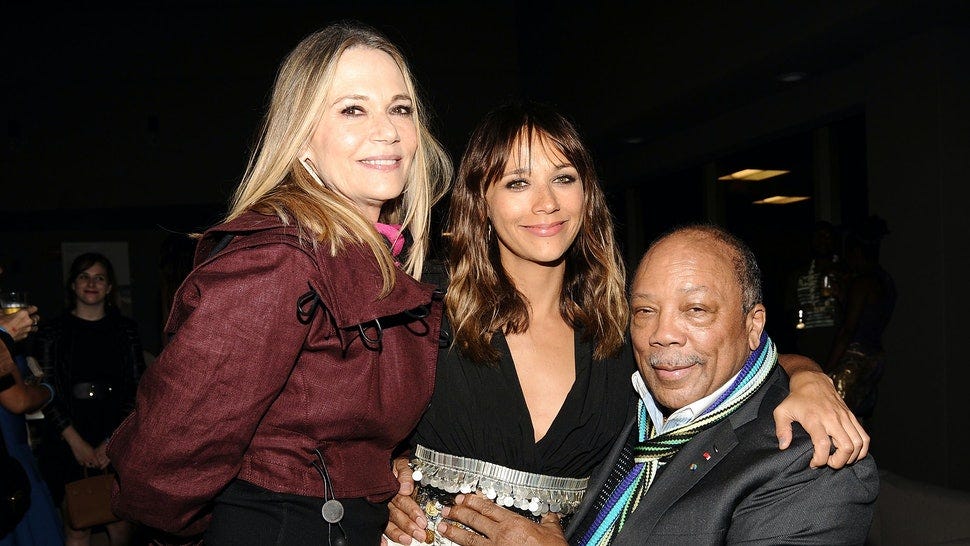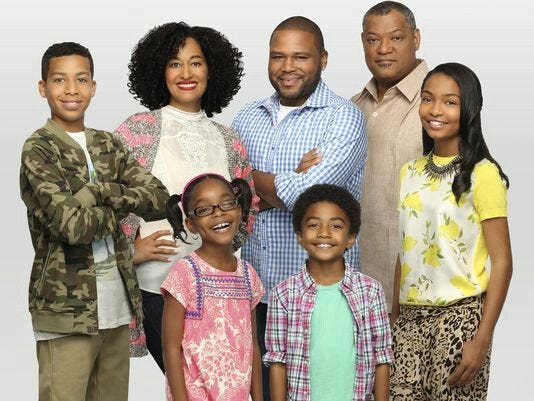Starting with a Digression...
I woke up last Saturday morning and checked Twitter (mistake), and discovered that #RashidaJones was trending. I assumed, correctly, that this was due the previous day's release of the new Netflix show, #blackAF, that she starred in.
What I was not prepared for was the reason she was trending. People somehow failed to understand that she was a Black woman and had issues with her starring in a show called #blackAF.
If one were to think that Rashida Jones was actually a white person, and that she had been cast to play a bi-racial Black woman, I could see why that would be extremely problematic.
But the fact of the matter is Rashida Jones is a bi-racial (Black/white) woman, which in this country often means you will be perceived of as Black. [See 41st President of the United States Barack Obama, Academy Award winner Halle Berry, Grammy Award Winner Alicia Keys, Reggae legend Bob Marley (didn't know that one, did ya!?)]
Her name is "Rashida." Her father is Quincy Jones. Her mother is Peggy Lipton.

She is Black. She is bi-racial. Those two things are not mutually exclusive.
A lot of the controversy on Twitter centered around two ideas: that Jones had "never" played the role of a Black woman before, but was profiting off of her Black side now, and that she was a non-Black person benefiting from her racial ambiguity with this role.
Come on, guys.
Let's move onto the show.
This faux outrage inspired me to actually watch #blackAF and feel it out for myself. I'd only seen the trailer one day before the premier, and placed it on my theoretical to-watch list (many many things are on this list...), but I had no plan to watch it anytime too soon.
After the Twitter incident it shot to the top of my queue and I turned it on.
In the show Kenya Barris - creator, producer, writer, and director of the series - plays himself. Kenya is also the real-life creator of the ABC hit series Black-ish, and its spin-off shows, Mixed-ish and Grown-ish. Black-ish is a semi-autobiographical show that depicts the everyday life of a large, somewhat messy, unusually funny, upper middle class, Black family.
#blackAF is a brief snapshot of the Barris family from the perspective of an amateur documentary shot by Kenya and Joya's (Kenya's wife, played by Rashida Jones) 17-year-old daughter. She's making the film as part of her application to NYU's film school. The faux documentary style of the show is a bit "more Christopher Guest than The Office" (h/t Miriam), and gives a perfect comedic remove from some of the show's subject matter which would be decidedly less funny otherwise. Namely: defining and dissecting Blackness, the nature of the "white gaze," and some very real relationship and family issues.
#BlackAF is essentially the same show as Black-ish.

(the Johnson family from Black-ish)
#blackAF can easily be seen as fitting within the same story-telling universe as that created by Barris' Black-ish family of shows and rehashes some of the basic themes and incidents. In #blackAF Barris talks about the emotional distance between him and his father. In Black-ish, we see Andre (Kenya's fictional alter ego) struggle to connect with his father even though the two are living under the same roof. In both shows, Kenya and Andre go through significant ups and downs with their impressive and career-driven wives Joya and Bow. Both shows feature Juneteenth as one of the most creative and memorable episodes of the season.
#blackAF, like Black-ish before it, aims to deal with race directly, and does so in a sometimes overt and educational way that can feel more aimed at white people than at Black people. Black-ish was lauded for wrestling with topics like: the 'n' word; the ubiquity of, and damage that can be done by, micro-aggressions; the complexity of being a Black person in a workplace dominated by white people, etc. A show about Blackness that's aimed at white audiences isn't an inherently bad thing, but some people feel that it's a bit unfortunate in a world where very little mainstream content is created by Black people and intended for Black people.
#blackAF Tells Barris' Story

(the fictional Barris family)
More than being somewhat autobiographical, like Black-ish, #blackAF feels like a barely-fictionalized depiction of Barris and his actual family. The protagonists are not upper middle-class, but instead are straight up rich. As in: crazy Hollywood home with a movie theater inside and a new Acura NSX and a Range Rover in the drive-way, Gucci or Fendi emblazoned on everything, a personal assistant and a maid running around, one kid at USC, another soon-to-be at NYU, and four more behind them, travel to a vacation on a private jet(!) kinda rich.
The physical home filled by the Netflix Barris family is nearly identical to that of the real Barris family. From Vanity Fair:
The #blackAF set duplicates Barris’s real home down to the gray, L-shaped modular sofa that dominates the living room, the Warhol-ish portraits of hip-hop trailblazers by Knowledge Bennett, the sleek turquoise pool, and the piano festooned with whimsical drawings by Hebru Brantley.
And the Barris family depicted on Netflix is nearly identical to Kenya's real family. Six kids, a bi-racial mother with a successful professional career, and a black father with a burgeoning film and television empire predicated almost entirely upon the concepts of blackness and family.

(the real life Barris family)
This very direct translation of real life is of course not unique for the medium of internet television, for the genre of comedy, or for art in general. Everyone's heard the adage 'write what you know,' and Barris has taken that to heart and found great success with it.
"All you can do is try and tell the most honest version of your story. And hopefully that connects - in the specificity of that. Every time I've ever tried to do something for everyone, I miss everyone. I literally just try to tell my version." (from THR Roundtable)
But is it Black AF?
A lot about the intention of Barris' new show is right there in the name '#blackAF.' It makes the suggestion that while his ABC show Black-ish was just sorta Black, this one would pull out all the stops. This idea, that Barris was held back by his previous network and found new freedom at Netflix, is true. His new show is structurally more interesting. It also has more swearing, drinking, references to murder, recreational drug use, and good, explicit music peppered throughout - things that you just can't pull off on network television. And what would likely have been one of the very best episodes of Black-ish - a politically charged examination of the world, from father to son - was never allowed to air because it was too controversial. No fear of that on his new platform.
Being hamstrung by the network, and having a desire for more creative and stylistic freedom, lead Barris to request an early release from his ABC/Disney deal. He then landed at Netflix with a new deal worth a reported $100 million and a license to make whatever he wanted.
And he made a new show telling his story...again.
And to be fair, I think the relatively popular criticism of Barris’ work being aimed at a largely white audience is a bit reductive. The mere fact of representation - of seeing Black people on the screen in everyday situations, succeeding while navigating some of the realities of being Black in America - is a nigh revolutionary act.
So, a Black man with $100 million and creative carte blanche from the biggest digital media platform in the world uses the opportunity to tell his story. A story of a Black family doing its best to make it in a world that sometimes sees them as outsiders.
Sounds Black AF to me.



